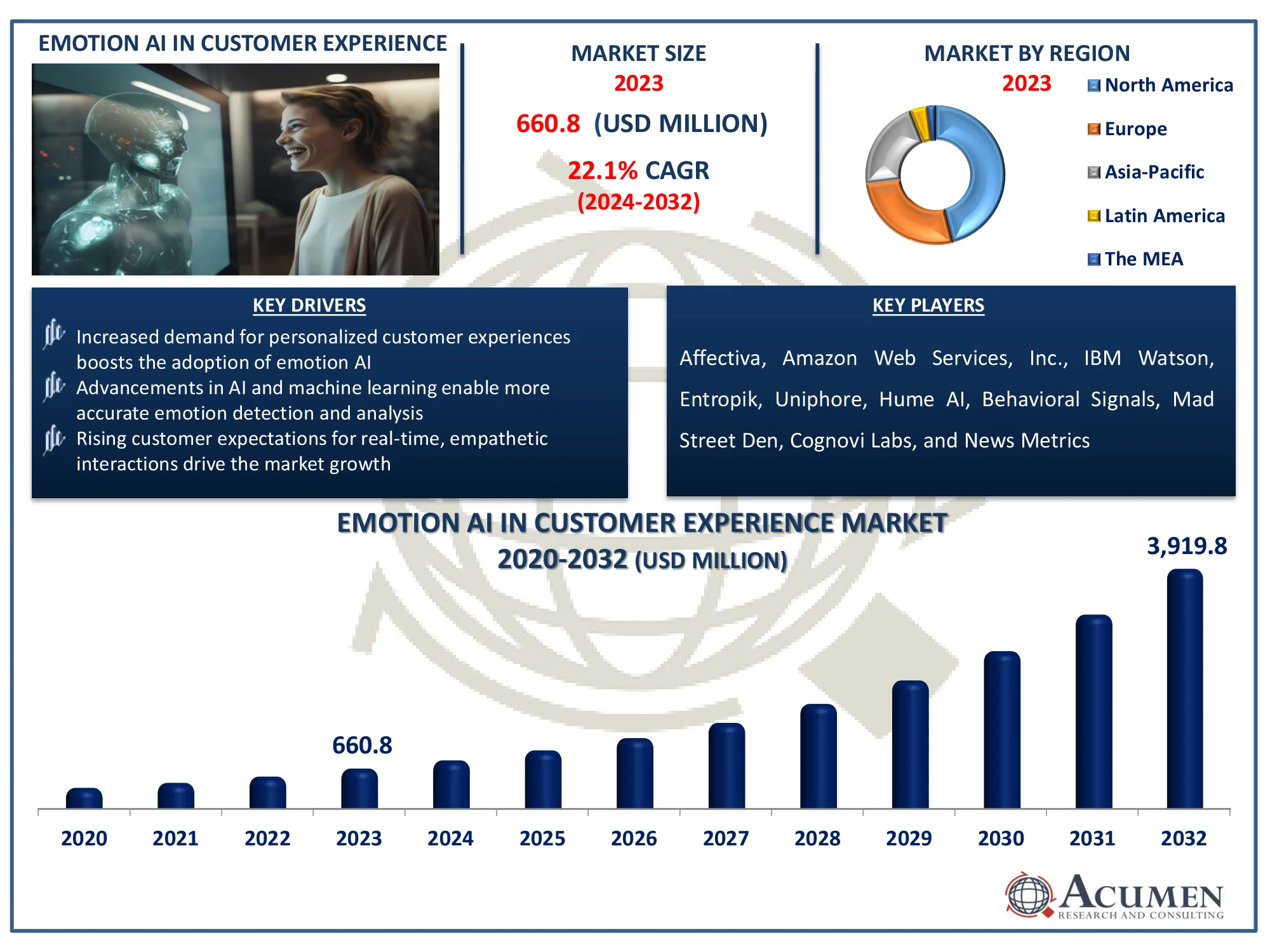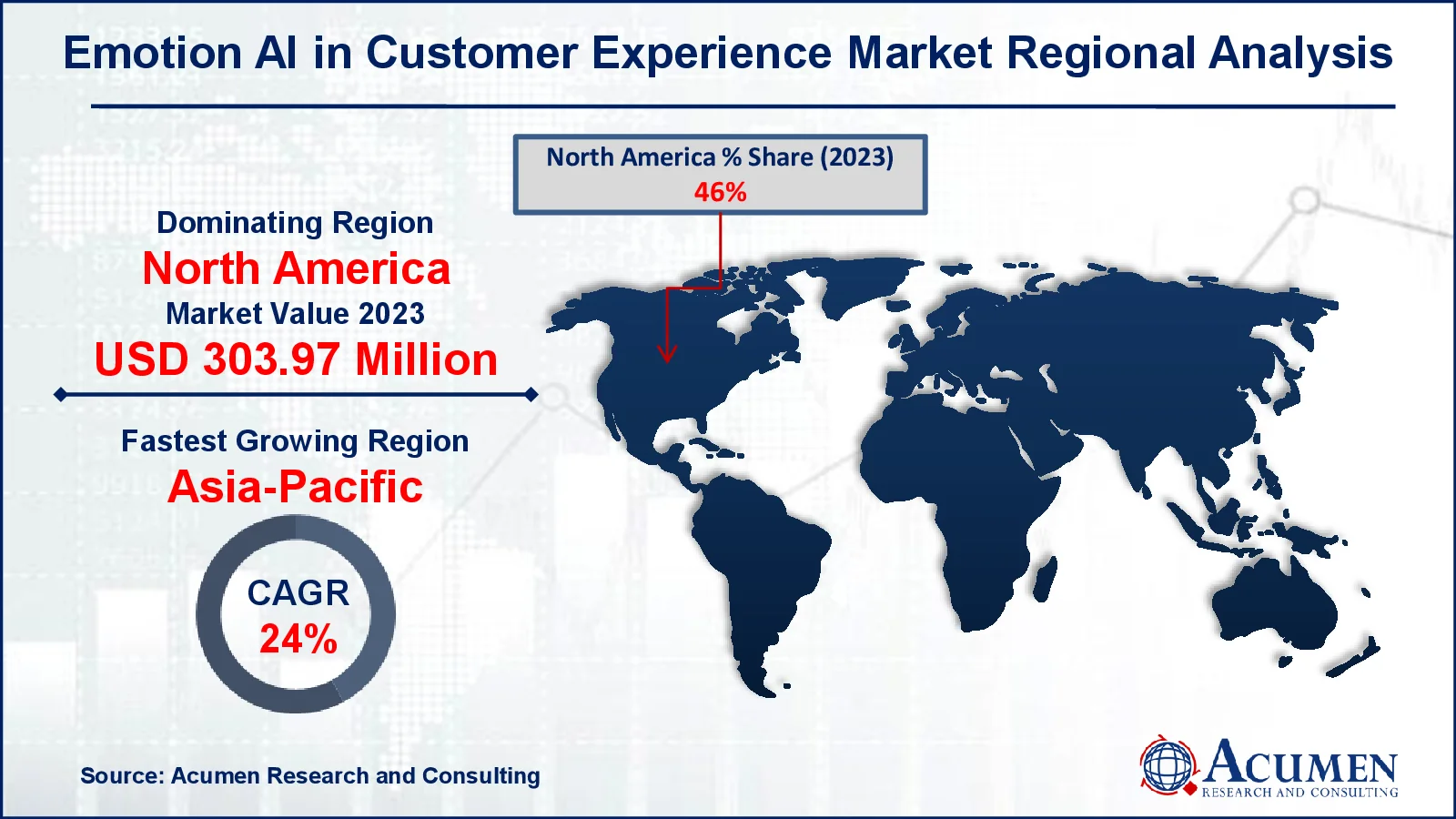March 2024
The Emotion AI in Customer Experience market is projected to grow from USD 660.8 million in 2023 to USD 3,919.8 million by 2032, driven by a CAGR of 22.1%. This market focuses on leveraging AI to enhance customer interactions and experiences.
The Global Emotion AI in Customer Experience Market Size accounted for USD 660.8 Million in 2023 and is estimated to achieve a market size of USD 3,919.8 Million by 2032 growing at a CAGR of 22.1% from 2024 to 2032.
Emotion AI in Customer Experience Market Highlights

Emotion AI in customer experience is the application of artificial intelligence technology to analyze and comprehend human emotions during interactions with customers. It uses facial expressions, voice tone, body language, and text sentiment to detect emotional indicators. This technology enables organizations to provide more personalized and compassionate encounters by responding to clients' emotional states in real time. Emotion AI can be used in customer service to modify communication styles, marketing to personalize content depending on emotional involvement, and sales to forecast consumer wants and behaviors. Emotion AI can help businesses improve customer pleasure, loyalty, and overall experience.
Global Emotion AI in Customer Experience Market Dynamics
Market Drivers
Market Restraints
Market Opportunities
Emotion AI in Customer Experience Market Report Coverage
|
Market |
Emotion AI in Customer Experience Market |
|
Emotion AI in Customer Experience Market Size 2023 |
USD 660.8 Million |
|
Emotion AI in Customer Experience Market Forecast 2032 |
USD 3,919.8 Million |
|
Emotion AI in Customer Experience Market CAGR During 2024 - 2032 |
22.1% |
|
Emotion AI in Customer Experience Market Analysis Period |
2020 - 2032 |
|
Emotion AI in Customer Experience Market Base Year |
2023 |
|
Emotion AI in Customer Experience Market Forecast Data |
2024 - 2032 |
|
Segments Covered |
By Component, By Technology, By Application, By End-Use Industry, and By Geography |
|
Regional Scope |
North America, Europe, Asia Pacific, Latin America, and Middle East & Africa |
|
Key Companies Profiled |
Affectiva, Amazon Web Services, Inc., IBM Watson, Entropik, Uniphore, Hume AI, Behavioral Signals, Mad Street Den, Cognovi Labs, and News Metrics. |
|
Report Coverage |
Market Trends, Drivers, Restraints, Competitive Analysis, Player Profiling, Covid-19 Analysis, Regulation Analysis |
Emotion AI in Customer Experience Market Insights
The increased demand for personalized customer experiences is prompting organizations to implement Emotion AI, which enables them to tailor interactions based on individual emotional responses. For instance, in March 2023, General Motors implemented the Adobe Experience Cloud enterprise solution to provide highly personalized marketing offerings and real-time client interaction experiences. Companies that understand emotions in real time can give more relevant and empathic responses, leading to increased customer satisfaction and loyalty. This shift toward tailored, emotionally intelligent offerings is accelerating the growth of emotion AI in the customer experience sector.
Advances in artificial intelligence and machine learning have considerably improved emotion recognition accuracy, allowing for more exact analysis of client emotions during interactions. These technologies allow organizations to better recognize emotional indicators such as tone, facial expressions, and text mood, hence improving the tailoring of consumer experiences. For instance, Facebook Messenger bots employ artificial intelligence and machine learning to assist customers in finding what they're looking for through easy conversations. This aspect improves the shopping experience for customers while also increasing profits. As a result, the capacity to respond more effectively to client emotions is propelling the rise of emotion AI in the customer experience market.
Concerns about privacy and data security considerably impede the adoption of emotion AI in the customer experience business. The collecting of sensitive emotional data raises concerns about abuse, breaches, and regulatory non-compliance, diminishing customer trust and discouraging enterprises from wider adoption. However, expansion of emotion AI applications in remote customer service and call centers offers growth potential in emotion AI in customer experience market, For instance, as per Partnership on AI Organization, call centers are leveraging AI to monitor callers’ and agents’ mood and tone, providing real-time interventions such as talking point suggestions for agents and alerts for supervisors, while AI chatbot apps, acting as virtual confidants, have achieved widespread adoption with over 2.5 million downloads. AI's ability to monitor mood, provide real-time interventions, and offer emotional support enhances service efficiency, personalization, and user engagement, driving adoption.
Emotion AI in Customer Experience Market Segmentation
The worldwide market for emotion AI in customer experience is split based on component, technology, application, end-use industry, and geography.
Emotion AI in Customer Experience Components
According to the emotion AI in customer experience industry analysis, the software component dominates market because of its critical role in processing, analyzing, and interpreting emotional data. Advanced algorithms, machine learning models, and natural language processing tools allow for real-time sentiment analysis and tailored consumer interactions. Software solutions are flexible and versatile, making them suited for a wide range of sectors and seamless integration with existing systems. Their constant advances and cost-efficiency increase their position as the market's primary development driver.
Emotion AI in Customer Experience Technologies
According to the emotion AI in customer experience industry analysis, machine learning is expected to increase at a notable rate due to its capacity to analyze large datasets, detect patterns, and continuously improve emotion recognition accuracy. Its applications include speech analysis, facial recognition, and sentiment identification, which enable personalized and adaptive customer interactions. Machine Learning's versatility and scalability make it an ideal choice for integrating emotion AI across several platforms. Natural language processing (NLP) growing in industry because to its capacity to analyze text and speech, allowing for real-time sentiment recognition and individualized answers.
Emotion AI in Customer Experience Applications
According to the emotion AI in customer experience industry forecast, customer support/service is predicted to grow significantly as more firms use AI to improve real-time sentiment analysis, personalized replies, and agent effectiveness in call centers and support channels. Other divisions, such as marketing and advertising, employ emotion AI to target campaigns, sales and lead generation optimize engagement methods, and product feedback and testing enhance user insights by evaluating emotional reactions to goods.
Emotion AI in Customer Experience End-Use Industry
According to the emotion AI in customer experience market forecast, retail is showing significant growth in market due to its emphasis on individualized customer interactions, targeted marketing, and improving shopping experiences through emotion-driven insights. Other industries, such as automotive, utilize emotion AI for in-car consumer experiences and feedback, whilst healthcare uses it for patient engagement and assistance. Entertainment and media use emotion AI to make content recommendations based on viewer emotions, while banking and finance use it to improve customer service and consumer trust. Telecommunications and other businesses are also using emotion AI to improve customer service and tailored connections.
Emotion AI in Customer Experience Market Regional Outlook
North America
Europe
Asia-Pacific
Latin America
The Middle East & Africa

Emotion AI in Customer Experience Market Regional Analysis
Currently, North America leads the emotion AI in customer experience market due to the presence of large technological companies and early adoption of AI-powered consumer solutions. The region's strong emphasis on innovation, combined with significant investment in AI research, accelerates the development and application of emotion AI technology. For instance, Secretary Blinken established the Partnership for Global Inclusivity on AI (PGIAI) in New York City on September 23, 2024, with officials from Amazon, Anthropic, Apple, Google, IBM, Meta, Microsoft, Nvidia, and OpenAI. The cooperation represents the United States Government and American industry's shared commitment to using combined experience, resources, and networks to realize AI's potential as a powerful instrument for long-term development and improved quality of life in developing countries. This collaboration is expected to accelerate the market growth of emotion AI in customer experience by fostering innovation and expanding AI applications for personalized, impactful customer interactions globally.
Asia-Pacific is rapidly expanding in emotion AI in customer experience market, owing to growing adoption of AI technologies in countries such as China, Japan, and India. The region's booming digital economy, big consumer base, and increased desire in improving customer experience with AI-powered solutions all help to drive its growth. For instance, according to the International Trade Administration (ITA), India's digital economy is expected to achieve a trillion-dollar valuation in the future years. As of mid-2024, there are more than 650 million smartphone users, and internet customers have topped 950 million in India. This widespread acceptance is fueling expansion in e-commerce, digital payments, and finance, as well as considerable investments in AI and blockchain technology.
Emotion AI in Customer Experience Market Players
Some of the top emotion AI in customer experience companies offered in our report include Affectiva, Amazon Web Services, Inc., IBM Watson, Entropik, Uniphore, Hume AI, Behavioral Signals, Mad Street Den, Cognovi Labs, and News Metrics.
Looking for discounts, bulk pricing, or custom solutions? Contact us today at sales@acumenresearchandconsulting.com
March 2024
October 2020
July 2022
July 2022